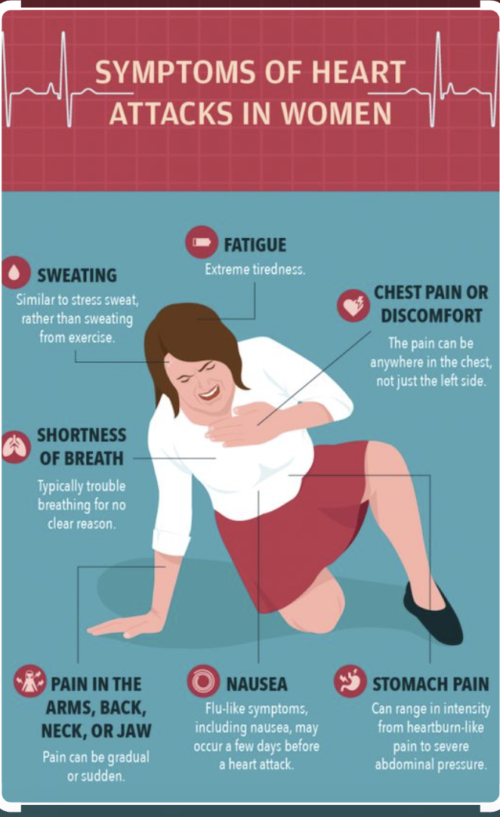GUEST POST by Dr. JENNIFER BEALL and Dr. LEIGH ANN HIGGINS
Did you know that the leading cause of death for women is heart disease? A recent study revealed that 68% of Americans were not aware of this fact.
For a long time, the medical community assumed that heart disease affected men and women similarly, but we have now discovered that heart disease can present very differently in women.
Women with heart disease don’t always present with classic (male) symptoms of left sided chest pain. Instead, they often have shortness of breath, dizziness, jaw pain or indigestion.
To illustrate how heart disease presents differently in women, let’s follow the course of our patient, Shelia, a lovely 66-year-old woman, who was being treating for hypertension and rheumatoid arthritis.
In an office visit Sheila mentioned that she had been experiencing shortness of breath for several months during her morning walks. Her lung exam and chest x-ray were both normal, which eliminated lung disease.
Patients like Sheila, who have rheumatoid arthritis, have a higher likelihood of developing cardiovascular conditions such as coronary artery disease, heart attack, heart failure, and stroke.
The inflammation that occurs in rheumatoid arthritis can affect the blood vessels and heart muscle, leading to accelerated atherosclerosis (hardening of the arteries) and increased risk of cardiovascular disease. This is also the case with many other inflammatory autoimmune conditions, which more often occur in women (80% of cases are women).

Rheumatoid arthritis frequently attacks the joints in the fingers where they become inflamed and misshapen
Stress tests are reliable indicators when looking for blockages in the larger coronary arteries. Shelia’s stress test was normal, which Sheila found reassuring, but her symptoms persisted. Were her test results wrong?
It turned out that Sheila had what is known as coronary microvascular disease. This is a term that many patients haven’t heard of, but it’s important for women to familiarize themselves with this subset of heart disease!
Coronary microvascular disease may NOT always be detected by traditional stress tests or coronary angiograms that evaluate our larger coronary vessels. It is more common in women who have smaller blood vessels than men. Often a cardiac MRI or other advanced imaging is required to make this diagnosis.
Once Sheila was accurately diagnosed, her blood pressure medication was changed to a medication known to help relax and widen the blood vessels, and she started a statin (cholesterol-lowering medication) and a daily aspirin.
Sheila adopted a heart healthy diet low in saturated fats and sodium, and high in fruits, vegetables, whole grains and lean proteins, often referred to as a Mediterranean diet.
To reduce her stress level Sheila has taken up meditation, while slowly getting back to her regular morning walks. Just 150 minutes/week of aerobic activity like walking can reduce cardiovascular risk. Thankfully Sheila is now feeling much better!
Follow these suggestions to keep your heart healthy:
See your doctor at least yearly.
Although family history increases your risk, most types of heart disease develop from a combination of genes and lifestyle factors. While you can’t control your genes, you can take steps to protect your heart:
-
Lose weight if you are overweight.
-
Do 150 minutes/week of aerobic exercise like walking, biking, or swimming.
-
Limit alcohol intake.
-
Avoid intake of saturated fats, like red meat and fried foods.
-
Do not smoke.
-
Reduce your stress levels with meditation and avoid social isolation.
-
Get enough sleep.
-
Manage hypertension, diabetes, and elevated cholesterol, if present
Seek care right away If you are experiencing any of these symptoms:
-
Chest pain or discomfort
-
Upper back, neck or jaw pain
-
Indigestion
-
Nausea or vomiting
-
Extreme fatigue
-
Dizziness
-
Shortness of breath.
Do what you can to educate the women around you about heart disease. Let’s all work together to save lives!
 Dr. Beall’s dream of becoming a doctor was set during her high school years when she worked in a lab at John Hopkins. She earned a BA from the Univ. of Chicago and a medical degree from the University of Maryland. She enjoys the variety of cases in her primary care practice along with the challenges presented by complex medical issues. When not at work, Dr. Beall and her husband and 12-year-old twins enjoying hiking and most summer sports.
Dr. Beall’s dream of becoming a doctor was set during her high school years when she worked in a lab at John Hopkins. She earned a BA from the Univ. of Chicago and a medical degree from the University of Maryland. She enjoys the variety of cases in her primary care practice along with the challenges presented by complex medical issues. When not at work, Dr. Beall and her husband and 12-year-old twins enjoying hiking and most summer sports.
 Dr. Higgins is a born and bred Mainer, who loves practicing in her home state. She has an undergraduate degree from Boston University and a medical degree from Loyola University. She is committed to a strong doctor-patient relationship, which she describes as listening, partnering with, educating, empowering and advocating on the patient’s behalf.
Dr. Higgins is a born and bred Mainer, who loves practicing in her home state. She has an undergraduate degree from Boston University and a medical degree from Loyola University. She is committed to a strong doctor-patient relationship, which she describes as listening, partnering with, educating, empowering and advocating on the patient’s behalf.





